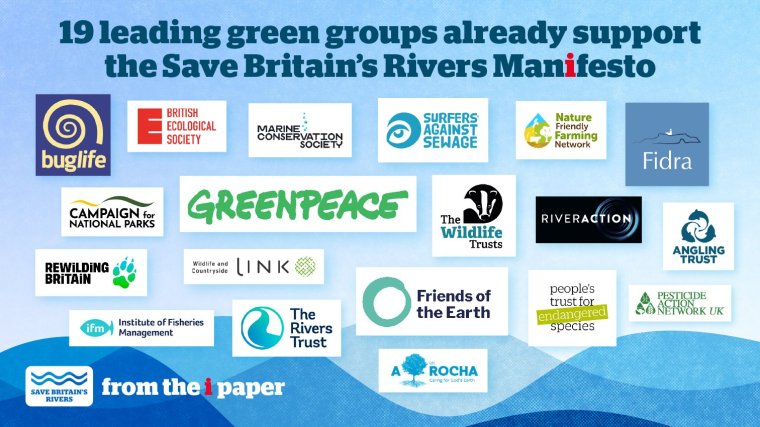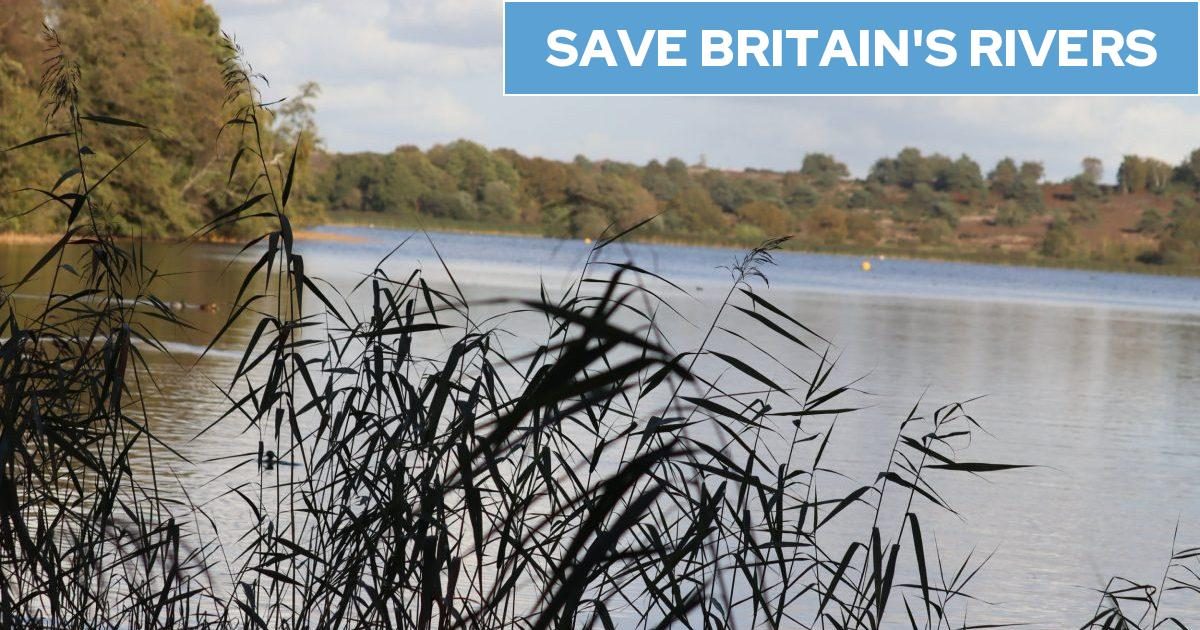High levels of harmful bacteria and medicines used to treat diabetes and seizures were discovered in samples collected from 23 rivers and lakes
Bathing sites across the UK have been discovered to be polluted with harmful bacteria, drugs, pesticides and genetic material that could create superbugs resistant to antibiotics, according to samples collected by citizen scientists.
River and lake swimming sites across the country were also found to contain E.coli at levels that are 20 times higher than would be deemed safe in the United States in the samples, along with medicines used to treat diabetes and seizures.
The findings were made by Watershed Investigations, a non-profit group, who collaborated with York University and Surfers Against Sewage to assess hundreds of water samples that people had collected from 23 rivers and lakes over a week in the summer.
At more than half the sites, E.coli levels were found to be above the US safety threshold and Frensham Great Pond in Surrey recorded the highest concentrations, followed by samples from the River Dart in Devon, the River Ribble in North Yorkshire and Lancashire and the River Wharfe in Yorkshire.
In almost all the waters tested, genes were detected which, if taken up by harmful bacteria or viruses, could create superbugs resistant to antibiotics. The most genes were found in the rivers Dart, Nidd, Ribble and Wye.
The findings come as antibiotic-resistant infections are increasing with 66,730 last year, compared with 62,314 in 2019. Most were caused by E.coli.
Professor Alistair Boxall of York University where the samples were analysed, explained that some of the genes detected were associated with “last resort” antibiotics which are used to treat severe infections which have not been tackled by other medications.
He said: “If the resistance genes are acquired by the pathogens, it will make those infections less treatable.
“The worst-case scenario is where you have antibiotic resistance genes, pathogens and chemical pollutants mixed together.”
He said swimmers could get sick in water with bacteria and resistance genes, which may produce proteins that make antibiotics ineffective.He added that the pollutants could work together to increase the risk of people being exposed to superbugs.
The Environment Agency tests bathing waters between May and September for E.coli and enterococci, which can spread infections. Sites are rated based on the results.
Will Gaze, professor of microbiology at Exeter University, says it is concerning that antibiotics have been found in samples at “near the levels that may be contributing to resistance in the longer term.”
While resistant genes can occur naturally, sewage and farm pollution are thought to be major sources. In the River Wye, on the border between England and Wales, some resistant genes could be traced to pig farming.
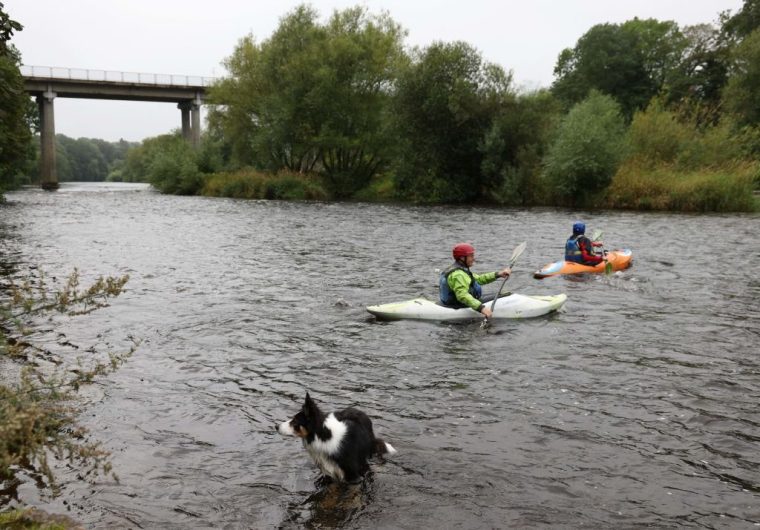 Some resistant genes traced to pig farming were found in the River Wye on the border between England and Wales (Photo by Darren Staples / AFP)
Some resistant genes traced to pig farming were found in the River Wye on the border between England and Wales (Photo by Darren Staples / AFP)
Dr John Wilkinson of York University said the farms used a high amount of antibiotics and that “genes that confer this resistance” seeped into the river through slurry on fields or medicines given to the pigs.
The River Cam in Cambridge and the River Ribble at Edisford Bridge, near Clitheroe in Lancashire, contained the most pharmaceuticals, pesticides, metals and industrial chemicals according to the samples.
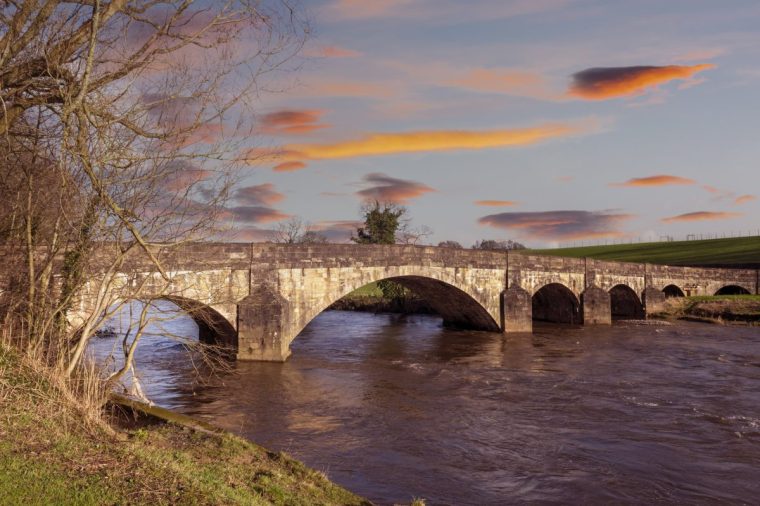 The River Ribble, near Cllitheroe, was one of the rivers found to contain the most pharmaceuticals, pesticides, metals and industrial chemicals according to the samples (Photo: Steve Goacher, Getty Images)
The River Ribble, near Cllitheroe, was one of the rivers found to contain the most pharmaceuticals, pesticides, metals and industrial chemicals according to the samples (Photo: Steve Goacher, Getty Images)
The tests also found perfluorooctanoic acid, known as PFOA, described as a carcinogen by the World Health Organisation, at 95 per cent of bathing sites.
None of the chemicals were found at concentrations known to affect public health but scientists are concerned about the effects on people and wildlife.
Professor Boxall said: “The concentrations of chemicals are unlikely to cause health impacts in the short term. “Some of the chemicals are known to cause impacts in the longer term from prolonged exposure, which is more concerning.
“Many of the chemical pollutants occur all the time in river water even when bacterial levels are low.”
The i Paper revealed earlier this year that swimmers have been warned against entering the sea at some of Britain’s most popular beaches, with those at the worst spots seeing an alert every three days over the summer due to pollution.
Popular summer hotspots including Blackpool, Weston-super-Mare, and Cornwall were among those hit by water quality warnings, the analysis of official data found.
The pollution alerts predict when there may be a high level of bacteria in the water, which can be down to many reasons, most commonly because of sewage discharges or agricultural pollution.
When the level of bacteria is predicted to be above a certain threshold, a warning against swimming is issued and signs are put up at the beach.
Giles Bristow, chief executive of Surfers Against Sewage said the true impact of the pollutants found in the samples collected by citizen scientists is still to be revealed. He said: “Yet the government is allowing them to swamp the wild waters where we surf, swim and where fragile ecosystems are on the brink of collapse.”
A government official said that “too many of our popular swimming spots” were polluted and said the government is consulting on reforms to bathing water regulations.
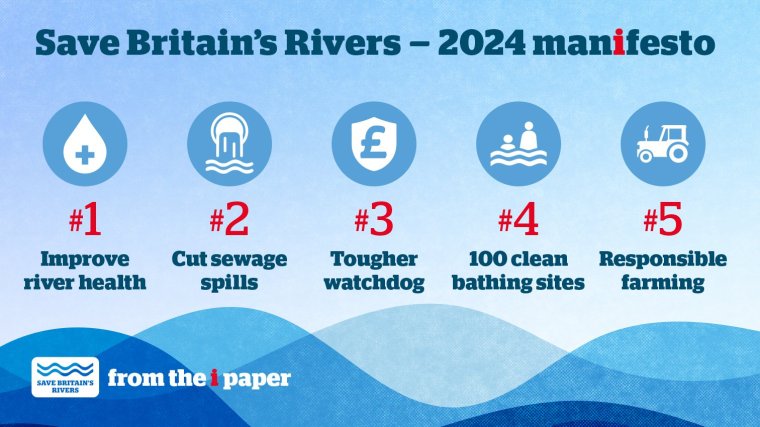 i is calling on all the political parties to sign up to its manifesto to Save Britain’s Rivers
i is calling on all the political parties to sign up to its manifesto to Save Britain’s Rivers
#1. RIVER HEALTH: 77% rivers in good health by 2027
Current situation: England’s rivers were once havens of biodiversity, but the vast majority are now struggling to support healthy ecosystems of plants and wildlife. Just 14 per cent of rivers in England are currently in good ecological health and not a single river has achieved good chemical health. The Government has set a legal target that 77 per cent will achieve good ecological status by 2027 – but without urgent action this will not happen.
Target: Within its first six months in power, the new Government will publish a roadmap on how it is going to achieve this existing legal target, and its long-awaited chemical strategy. The plan must include increased funding for the Environment Agency so the watchdog can do its job – and enforce the law.
#2. SEWAGE: Sewage spills will not damage high-priority areas – including bathing spots and nature sites – by 2030
Current situation: Bathing waters and nature sites are being destroyed by sewage spills, but water companies will not be required to clean up all these spaces until 2045.
Target: Untreated sewage will not cause damage to high-priority sites (which are bathing spots, protected nature sites, National Parks and chalk streams) by 2030. Water companies who fail to meet this target will be prosecuted. Nature-based solutions will be used to clean up sewage wherever possible.
#3. WATCHDOG: Regulators will stop water companies destroying the environment in pursuit of profit
Current situation: Water companies have paid their investors healthy dividends while failing to invest enough in their infrastructure to prevent environmental harm. This is partly caused by a disjointed regulatory system that prioritises economic outcomes over the environment.
Target: Within its first year in power, the new Government will publish a plan to reform regulation of water companies. This plan must be legislated on and executed within the first term of Parliament. This will include tougher powers to restrict dividends and bonuses for underperforming water companies, alongside greater resources to pursue prosecution. A “green duty” will be placed on Ofwat, which will force the regulator to place greater emphasis on the environment when making decisions over water companies’ business plans.
#4. BATHING: Create 100 clean bathing spots in rivers by 2030
Current situation: People in the UK have discovered the joy of wild swimming. But there are only 15 official bathing spots in English rivers, and many are not safe.
Target: 100 bathing spots in English rivers by the end of the new parliamentary term. The Environment Agency must start monitoring water quality throughout the year and take action to improve water quality at these sites. Bathing regulations will be altered so polluters can be prosecuted when bathing sites fail water quality tests.
#5. FARMING: Farmers must be funded to improve water quality, and face enforcement action if they damage the environment
Current situation: Agriculture is the biggest source of pollution in many rivers, but many farmers warn they are struggling to make ends meet under post-Brexit farming subsidies. Meanwhile, the Environment Agency is failing to enforce farming water-quality regulations.
Target: Within its first year in power, the new Government will strengthen its Environmental Land Management scheme so farmers are given more grants, support and advice to undertake activities that will improve water quality. The Environment Agency will commit to a year-on-year increase in the number of farms being inspected – and take enforcement action against those who commit breaches of the “farming rules for water”.
